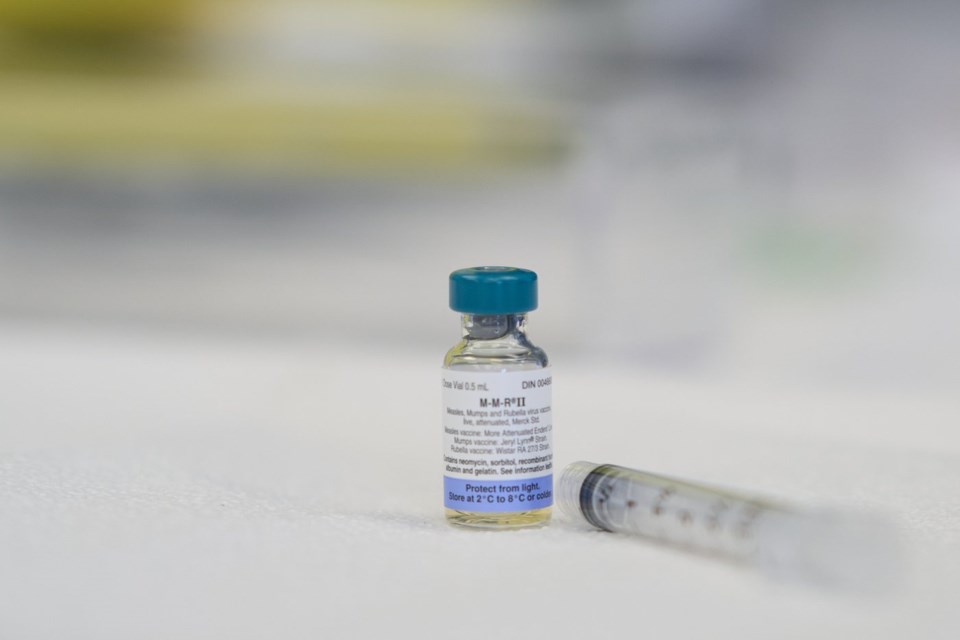FREDERICTON — At least three out of the four Atlantic provinces have released data revealing their measles vaccination rates in children are below the 95 per cent threshold recommended by scientists to prevent the disease from spreading.
In Nova Scotia, the provincial government told The Canadian Press that about 23 per cent of children were not fully vaccinated for measles in 2024. Brooke Armstrong, Health Department spokeswoman, said 93.4 per cent of two-year-olds had at least one dose of vaccine and 78.6 per cent of two-year-olds had both required shots.
Prince Edward Island and New Brunswick say about 10 per cent of children are not fully vaccinated for the disease. Autumn Tremere from Prince Edward Island's Health Department said between 91 per cent and 94 per cent of children in Grade 1 had received two doses.
New Brunswick Health Department spokeswoman Tara Chislett said the 2023-24 school immunization report showed 91.2 per cent of students with proof of immunization were up to date for the measles, mumps and rubella vaccine.
Newfoundland and Labrador did not respond to requests for information on vaccination rates for measles.
Canada has seen 3,703 measles cases this year from Alberta, British Columbia, Manitoba, Northwest Territories, Nova Scotia, Ontario, Prince Edward Island, Quebec and Saskatchewan.
In June, Ontario's chief medical officer of health said the province's outbreak began last fall when six babies were born with congenital measles — they were infected in the womb through their unvaccinated mothers — and one infant died.
Janna Shapiro, a post-doctoral fellow in immunology at the University of Toronto, said communities need to vaccinate at least 95 per cent of their population with two doses to stop the disease from spreading, a threshold known as herd immunity.
That threshold is directly related to how contagious a disease is, she said. "Since measles is very highly contagious, we need a very high percentage of the population to be two-dose vaccinated to prevent it from spreading."
It's not enough for the provincial average to reach 95 per cent — every community needs to have at least a 95 per cent vaccination rate, Shapiro said.
Ontario, which has seen more than 2,200 cases of measles this year, has pockets where rates are "much lower" than the provincial average, she said. "On a provincial level, vaccination rates are pretty high, but in specific communities, vaccination rates are quite low," Shapiro said. "And when you have a community where there's lower vaccination rates, that is enough to allow measles to spread."
About one in 10 children will develop complications from measles, such as ear infections, pneumonia or diarrhea; about one in 1,000 children will die from a measles infection, she said. Measles temporarily "wipes out" a child's immune system, leaving them much more susceptible to a host of other infections, Shapiro noted.
Tania Watts, Canada Research Chair in antiviral immunity at the University of Toronto, said a number of factors could explain measles vaccination rates in Atlantic Canada. At the height of the COVID-19 pandemic, she said, many people skipped doctor visits, reducing the opportunity for children to be vaccinated.
A lack of access to family doctors — who are usually the first point of contact to the health system and can help debunk vaccination misinformation — could also be factor, she said. Complacency, meanwhile, could help explain the low rates, as measles was declared eliminated in 1998 in Canada and many families haven't been exposed to the damage the disease causes.
"I think people don't always understand the risk of an infection versus a vaccine — where the risk from getting the infection is much, much worse than the tiny, tiny risk of some adverse event in a vaccine," Watts said.
"Vaccines save lives and they prevent severe complications of diseases."
This report by The Canadian Press was first published July 9, 2025.
Hina Alam, The Canadian Press



